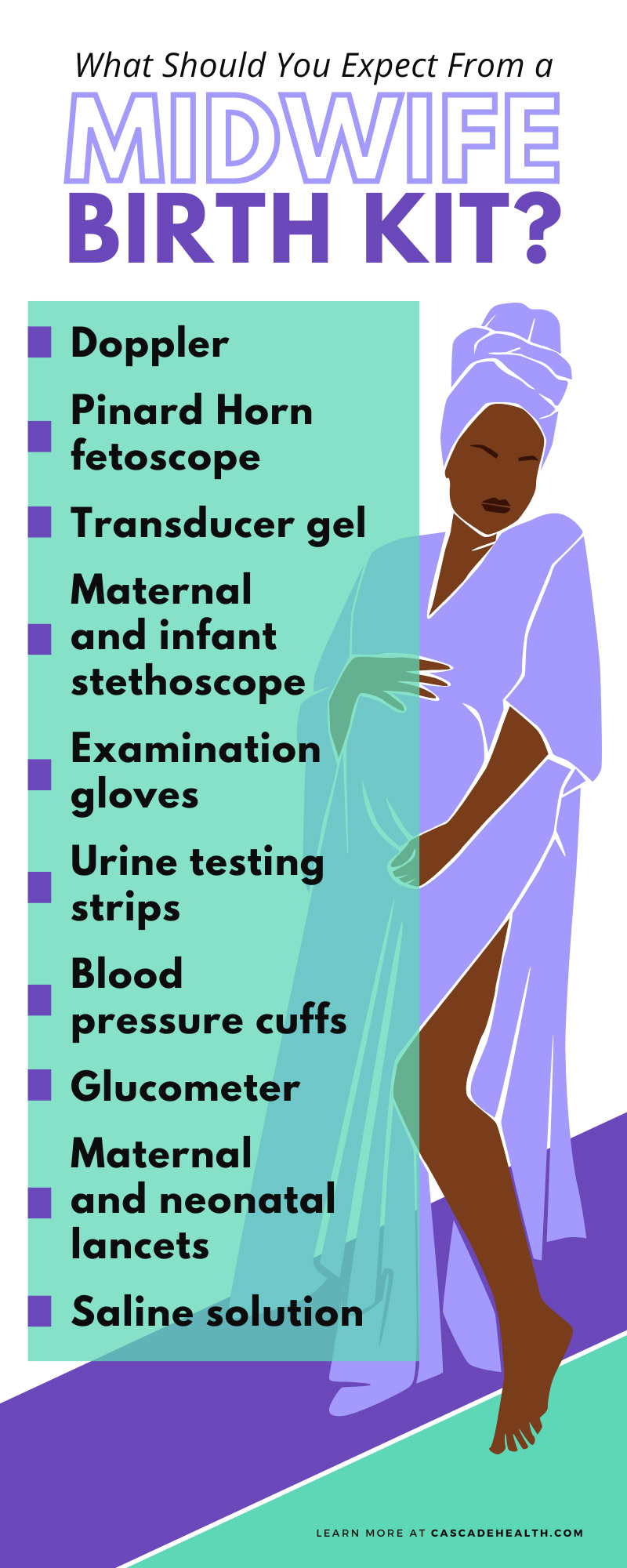What Should You Expect From a Midwife Birth Kit?
Upon hiring a midwife for a planned home birth, you might be wondering what they will bring and how their kit can assist you. While the process of laboring and delivering your baby will come from a much deeper strength than you had ever anticipated, the things a midwife brings to the table will provide an expecting mother with peace, comfort, assurance, and, most of all, quality midwifery care.
While some midwives will request that you supply the appropriate tools at home, others will order and fulfill their own kits designed for an in-home appointment or home birth. Typically, the best way for a midwife to set up is to order a starter kit, complete with the necessary tools, and then build from there. But sometimes, a midwife will order pertinent home birth supplies in bulk that they will bring, and they’ll request that the patient supplies the rest based on preferences.
In this article, we discuss the things you can expect from a midwife and the kit they carry, and how these tools and aids will support your home birth experience.
What You Can Expect From a Midwife
Before we dive into what you can expect out of a midwife’s home birth kit, let’s take a closer look at some general expectations for a midwife’s duties. When you find out you’re pregnant, one of the first things you should consider is scheduling an appointment with a few midwives to find the one that suits your preferences and needs. Because labor and delivery will bring you to the most vulnerable state you will ever experience, it’s vital to seek out a suitable midwife to walk through this journey with you.
There’s a bit of confusion about what a midwife does, as many people believe that a doula and a midwife are synonymous. However, a certified nurse midwife receives medical education and training to help deliver babies. On the other hand, a doula is birthing support.
When you find the perfect midwife for you, you will know. And you can expect a few things from this individual. Much like your primary doctor or OB, your preferred midwife can do the following:
- Perform basic antenatal appointments
- Take care of abdominal exams and cervical checks
- Assist in curating birth plans—at a home, hospital, or birthing center
- Provide guidance on nutrition and supplement support
- Educate you about pregnancy, birth, and postpartum care
- Offer emotional and physical support during your labor
- Deliver the baby
What You Can Expect From a Midwife Kit
In addition to the care, support, and guidance you can receive from your overseeing midwife, they will often carry a kit of tools and supplies that help them perform their duties from anywhere. Commonly, you will see a midwife bring their kit to in-home visits or home births and reach into their bag when the moment calls.
It’s essential to note that every midwife will have varying items in their kit since they use some supplies more than others. But at the baseline, almost every midwife kit will contain the following:
- Doppler
- Pinard Horn fetoscope
- Transducer gel
- Maternal and infant stethoscope
- Examination gloves
- Urine testing strips
- Blood pressure cuffs
- Glucometer
- Maternal and neonatal lancets
- Saline solution
- Cord clamps or ties
- Suturing supplies
- Vaginal speculum
- Handheld mirror
- Gauze or wound care supplies
- Episiotomy scissors
- Receiving blanket
A midwife kit will range in exact supplies and quantities, so partner with your primary midwife to discuss the vital tools they carry or what you wish for them to bring.
Home Birth Basics
After a midwife stocks their supply kit, it’s common for them to ask the expecting mother and family to supply the birth station with supplies that may assist in labor or delivery. Generally, this supply list is items people already have around their homes and don’t need to buy.
Consider the following items for your home birth to accompany your midwife’s kit:
- Bath towels
- Birthing pool
- Birthing pool supplies, such as a hose, heater, and temperature gauge
- An extra fitted bed sheet
- Washcloths
- Receiving blankets
- Clothes for your baby
- Comfortable postpartum attire
- Diapers
- Plastic sheet (shower curtain is perfect)
- Your preferred choice of protein
- Dark-colored trash bags
- Thermometer
- Large plastic mixing bowl
- One bottle of rubbing alcohol
Quantities and items may vary based on preferences, demands, and your midwife’s kit. Partner with your overseeing midwife to create a supply list and preparations checklist for your desired birth plan.
Preparations and To-Do’s
Between you and your family and midwife, there will be a long list of things to prepare and complete to ensure you’re ready at home. Around the 34-week mark, your midwife may begin instructing you to think about setting up ideal stations in your home where they can easily and quickly access your supplies. But closer to the 37-week mark, the final preparations should begin, as this is when a mother is full term, and your midwife will begin around-the-clock check-ins to monitor your progress.
It’s advantageous to have your midwife come to your home several times in the three weeks leading up to your due date. In these visits, they will help guide you through creating adequate birth stations in your home, walk you through what you can expect in the coming days, and help you navigate any last-minute fears or doubts.
Remember that, while they carry a kit of supplies and possess the necessary education, they walk with you through your pregnancy and are there to support your emotions. You can rest assured that they will hold your hand in every step to come.
There are a lot of things you can expect your midwife to bring to the table, including their trusted kit of supplies. Here at Cascade Health Care, we help midwives, mothers, and anyone seeking professional-grade tools and supplies fulfill their kits and ease their minds. We offer birthing pools, complete home birth kits, mothers’ sanitary supplies, and much more. We understand the importance of preparations and preparedness, and that’s why we guarantee to cover all your needs in the labor and delivery process.

Recent Posts
-
What Midwives Should Teach New Parents Regarding Breastmilk
The transition into parenthood presents a profound physiological and emotional shift for growing fam
-
Best Practices for Cleaning and Maintaining Pulse Oximeters
Midwives and medical professionals understand the critical nature of accurate patient data. When mon



